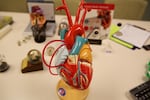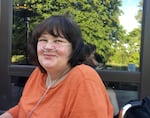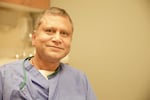
Doctors familiar with OHSU's heart transplant program think it'll be several months before the program can hire the staff needed to restart. Meanwhile, some patients are frantically trying to get on the transplant list at other hospitals.
Kristian Foden-Vencil / OPB
The heart transplant program at Oregon Health and Science University imploded last week as the last of its four cardiologists left.
OHSU officials issued a statement saying they've notified the nation's organ sharing system of the closure, and the heart program won't open again until it has sufficient staff to care for patients.
Nobody from the university would talk on the record, but in the statement, OHSU administrators say they are fully committed to ensuring patients have immediate care and that OHSU's current 20 transplant patients either have plans to transition to a different hospital or have decided to wait until OHSU can restart its department.
Among those patients is 58-year-old Dianna Howell from North Albany. Howell and her husband, Jeff, went to OHSU last Friday knowing two doctors had already left the program. But they didn’t think much about it.

Dianna Howell is one of 20 OHSU patients looking for a new heart. She said she's devastated by the closure.
Kristian Foden-Vencil / OPB
“Then when we went to the appointment, a third doctor told us that he was leaving, that he didn’t feel like he could stay anymore," she said. "We were very concerned: One doctor for everybody in the program? And the next day, we got a phone call saying the program was canceled.
“... To say we were terrified would be an understatement.”
Howell had her first open-heart surgery in 1996 after experiencing shortness of breath and chest pains. Howell said she needs daily medical interventions to stabilize her heart, and now she’s desperately trying to find somewhere else to go.
OPB caught up with her on a five-hour drive from home to the heart transplant program at UW Medicine, the health system of the University of Washington in Seattle.
“I’ve been referred to Seattle, but that doesn’t mean Seattle will take me or any of the other people sent up there,” she said.
Dr. Jason Smith, a cardiac surgeon at the University of Washington, said they’ve received eight patient referrals from OHSU, but those patients will need to be assessed before being accepted.
“OHSU is a very reputable, or was a very reputable group of cardiologists," he said. "They would have evaluated the patients appropriately. So my expectation is that they will all be listed without problem.”
The other piece of good news for patients is that the time they’ve spent on OHSU’s waiting list will be honored by the University of Washington. So if they've already been waiting six months, they'll be put ahead of a UW patient who's only been waiting five.
Still, Howell said she’s devastated. For her, this is quite literally a life-and-death situation. She said OHSU found a match for her heart last year, but she was sick, so she wasn't eligible for the transplant.
Now she’s in limbo.

Dianna Howell and her husband Jeff now have a five hour drive to Seattle for every doctor appointment. She's also looking at living up there for three months after the operation.
Provided by Jeff Howell
Even if she’s taken by the University of Washington, the distances involved complicate matters — for example, she needs oxygen constantly.
“So we’re in the car with a basket full of oxygen tanks hoping that they’re going to last long enough to get there and get back and do what I need to do,” she said.
Howell would also have to live in Seattle for three months or so after any operation to make sure she doesn’t come down with an infection.
If she had the transplant in Portland, she says she'd be able to live at home in North Albany and drive to OHSU. But Seattle is too far to commute.
“And I will have to find another person, someone who has the time to come and live with me," she said. "You have to have a caregiver."
Howell also has a small cardiograph implant that doctors use to monitor her heart. She's uncertain whether that's compatible with the equipment used for cardiac treatments in Seattle.
“I would get calls back from the doctor. They would look at the results and tell me: 'Take this medication or don’t take this medication. The pressure in your heart is low, or the pressure’s high,'" she said. "I don’t even know yet if Seattle can read the cardiogram."
Howell is also worried about losing the long-term relationship and understanding that she developed with staff at OHSU.
The teaching hospital isn’t saying why the cardiologists left. But patients, doctors and national transplant organizations tell OPB the problem stems from personnel issues.
A former cardiologist from the program filed a civil lawsuit earlier this year alleging that she was subjected to sexual and racial discrimination at OHSU.
State leaders have been largely quiet about the fact that Oregon no longer has a heart transplant program.
The Oregon Health Authority said it doesn’t investigate the closure of programs unless there’s a compliance issue. And there have been no complaints submitted about OHSU's heart transplant program.
The state’s leading legislative voice on health care, Rep. Mitch Greenlick, D-Portland, said he doesn’t have a clue on the topic.
An internal memo from the Providence Heart Institute in Portland said its leaders are discussing taking former OHSU patients.

Legacy surgeon Dr. Pasala Ravichandran used to work at the OHSU heart transplant program. He thinks it'll be about six months before the program can be started again.
Kristian Foden-Vencil / OPB
And cardiac surgeons at Legacy Emanuel in Portland are also ready to take patients, said Dr. Pasala Ravichandran.
Doctors at both hospitals can do everything up to an actual transplant operation, and they can handle all the post-operative health care. But neither can actually do the transplant.
Ravichandran used to work for OHSU’s transplant program. He said he thinks it’s going to be six months before it will be re-established — especially because there is stiff competition for cardiologists among health care providers.
“It is going to be a problem recruiting because they are highly sought after, and heart failure cardiologists are a really special breed,” he said.
But Ravichandran said he doesn’t think this is the end of the OHSU department. He thinks Oregon has the population for one and maybe even two heart transplant programs.
Dr. Andrew Tsen, the medical director of cardiac surgery at Legacy Emanuel, agrees.
“I think that Oregon should have its own transplant program ... you know the hearts that are donated are coming from Oregon citizens," Tsen said. "We should keep those resources within the state."
Tsen added, "The hearts should be allocated on a national basis if there’s need."

“I think that Oregon should have their own transplant program," said Dr. Andrew Tsen of Legacy. "You know the hearts that are donated are coming from Oregon citizens, we should keep those resources within the state. Of course they should be allocated on a national basis if there’s need. And that’s part of the reason we have this national organization called UNOS.”
Kristian Foden-Vencil / OPB
The United Network for Organ Sharing does just that. Spokeswoman Anne Paschke said personnel issues are the main reason transplant centers shut down.
In 2016, 40 people were added to OHSU’s waiting list, according to UNOS. Twenty-three received a new heart at OHSU. More than 90 percent were still alive after a year.
The shortest journey for any Oregonian to get a transplant now stands at about three hours, or the distance from Portland to Seattle. For someone in Bend, the journey is twice as long.
On the East Coast, there’s a transplant program about a two-hour drive from anyone.
